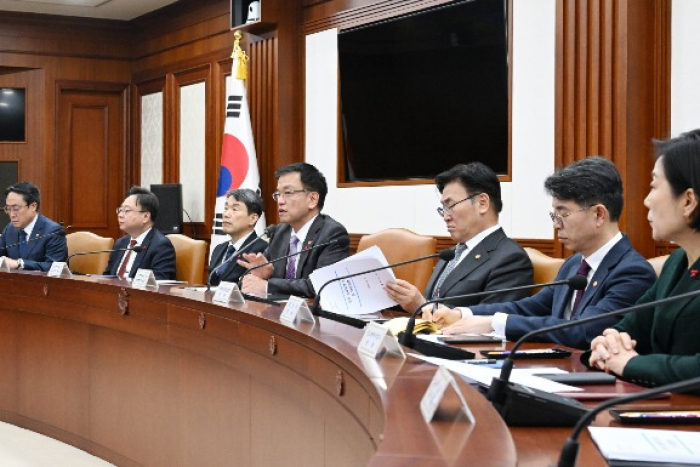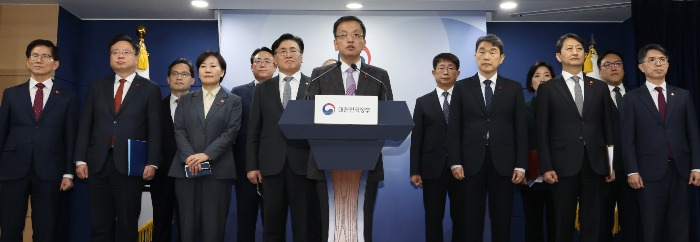Economy
South Korea’s economic system remains resilient: finance minister
The country’s finance ministry expects limited impact from the recent political upheaval on Asia’s No. 4 economy
By Dec 08, 2024 (Gmt+09:00)
3
Min read
Most Read
LG Chem to sell water filter business to Glenwood PE for $692 million


KT&G eyes overseas M&A after rejecting activist fund's offer


Kyobo Life poised to buy Japan’s SBI Group-owned savings bank


StockX in merger talks with Naver’s online reseller Kream


Meritz backs half of ex-manager’s $210 mn hedge fund



The South Korean economy is solid, and the government will take “bold and swift’’ actions if needed to stabilize Asia’s fourth-largest economy, Korea’s Finance Minister Choi Sang-mok reiterated on Sunday.
“The Republic of Korea’s economic system remains resilient, and the government’s emergency response plans are working well,” Choi said in a press conference on Sunday afternoon following the ministry’s emergency economic meeting with other government agencies.
“The government will stay vigilant," he said.
The meeting was held in response to growing economic uncertainty after the National Assembly on Saturday failed to impeach President Yoon Suk Yeol over his declaration of martial law on Tuesday night, after an overwhelming majority of governing party lawmakers boycotted the vote.
Denouncing the ruling People Power Party’s action as a second coup, the opposition Democratic Party vowed to continue filing an impeachment motion against Yoon every week until the president is either ousted or resigns.

The impeachment vote outcome has heightened political uncertainty in Korea, said political and economic analysts, who also warned that the increased and persisting political risk would add to the country's woes. Korea is already teetering from a slowing economy and fears of growing trade protectionism under President-elect Donald Trump’s new administration.
ACTIVE COMMUNICATION WITH FOREIGN INVESTORS
Choi, however, dismissed any significant adverse impact of the political upheaval on the economy, citing turbulent times in the past when the economy stayed relatively resilient.
Instead, he urged the National Assembly and the government to work closely to ease economic and market uncertainties in order to restore investors’ confidence.
“It is important to preserve our country’s sovereign rating,” said Choi, adding that the government will communicate with foreign investors and the international community to help them better understand Korean economic conditions and government measures.
Global credit rating agencies Fitch Ratings, S&P and Moody’s have all kept their sovereign ratings of South Korea unchanged in the wake of the martial law debacle.
But they warned that downside pressure on the Korean economy and its credit rating would increase if the political turmoil persists.

Choi also pledged that the government will take prompt actions to deal with the growing uncertainty on the global trade front.
“We will swiftly respond to external uncertainties stemming from the new US government and stabilize our people's livelihoods,” said Choi. “We must not waste the critical time that determines the fate of our (mainstay) industries” such as the semiconductor, shipbuilding, shipping and petrochemical sectors.
After the emergency meeting with ministers from the Ministry of Trade, Industry and Energy, Ministry of SMEs and Startups and Ministry of Agriculture, Food and Rural Affairs, Choi met with Bank of Korea Governor Rhee Chang-yong and the chiefs of the Financial Services Commission and the Financial Supervisory Service to discuss measures to stabilize the country’s financial markets.
Following the short-lived martial law decree, the four ministry chiefs have been meeting daily to discuss measures intended to stabilize the financial market.
The Korean won, however, weakened 1.8% against the US dollar over the past week due to the martial law-triggered political uncertainty, becoming the worst-performing Asian currency against the dollar.
On Thursday, the Korean government launched a task force to monitor the country’s economy and financial markets.
Write to Kyung-Min Kang and Sang-Yong Park at kkm1026@hankyung.com
Sookyung Seo edited this article.
More to Read
-
 Business & PoliticsS.Korea's Yoon survives impeachment; economic fundamentals firm
Business & PoliticsS.Korea's Yoon survives impeachment; economic fundamentals firmDec 07, 2024 (Gmt+09:00)
4 Min read -
 Business & PoliticsSouth Korea’s president apologizes for martial law
Business & PoliticsSouth Korea’s president apologizes for martial lawDec 07, 2024 (Gmt+09:00)
1 Min read -
 EconomyKorean economic policy chiefs play down martial law impact
EconomyKorean economic policy chiefs play down martial law impactDec 06, 2024 (Gmt+09:00)
3 Min read -
 EconomyKorea’s credit fundamentals remain firm amid political crisis: Fitch
EconomyKorea’s credit fundamentals remain firm amid political crisis: FitchDec 06, 2024 (Gmt+09:00)
2 Min read -

-
 Korean stock marketKorean stocks diverge: Winners, losers of Yoon’s martial law debacle
Korean stock marketKorean stocks diverge: Winners, losers of Yoon’s martial law debacleDec 04, 2024 (Gmt+09:00)
3 Min read -
 MarketsBOK to buy repos to counter martial law-driven market tantrum
MarketsBOK to buy repos to counter martial law-driven market tantrumDec 04, 2024 (Gmt+09:00)
4 Min read
Comment 0
LOG IN


